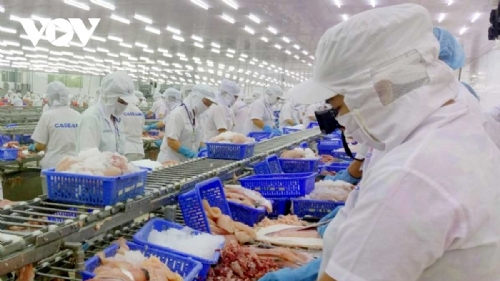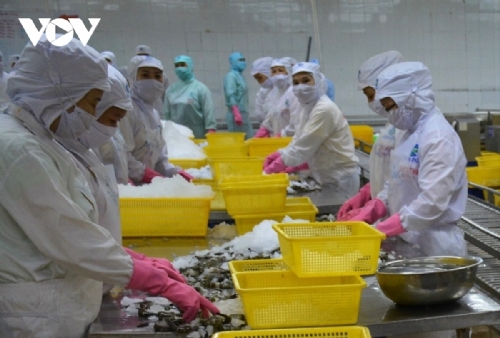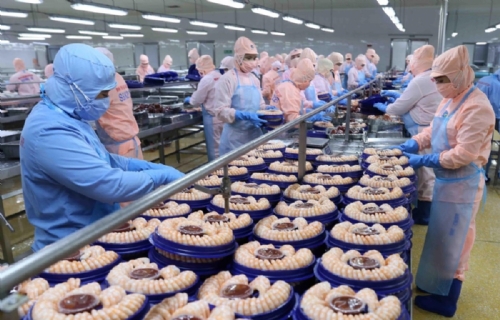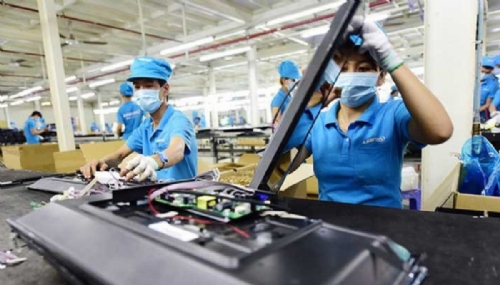The Trust of The People And Businesses To The Customs Has Doubled
Friday, January 11, 2019 10:21
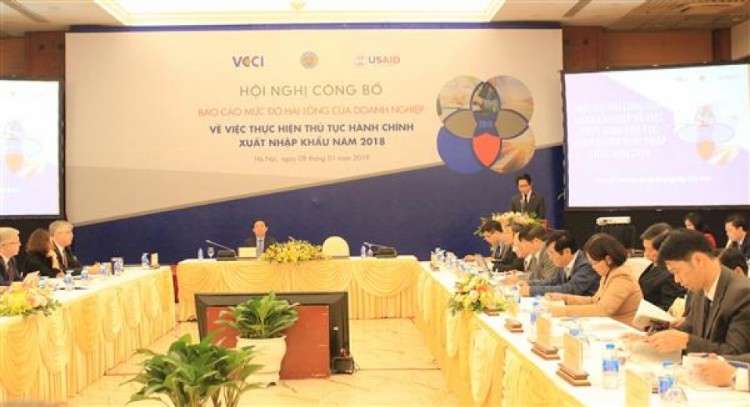
More than 3,000 enterprises have participated in surveying the satisfaction level about implementing administrative procedures in import and export activities in 2018. This is the largest scale survey in the last 4 years. The survey report was published this morning, January 8, 2019.
Effectiveness of reform for enterprises
Opening the conference to announce the results of the survey, Chairman of Vietnam Chamber of Commerce and Industry Vu Tien Loc said that in the past years, the Customs industry was the pioneer of administrative procedure reform, which contributed to important results of the cross-border trade transaction index. The survey results show that the trust of people and businesses has doubled in the past years.
Mr. Vu Tien Loc said that Vietnam's economy has a high degree of openness, import and export turnover reached nearly 500 billion USD, showing that cross-border trade activities play an important role, this index assesses competiveness. Vietnam cannot compete if the cross-border trade index is not advanced in the world.
At the conference, Deputy General Director of Customs General Department Hoang Viet Cuong also informed about the results of administrative procedure reform and customs modernization in the past, as well as the orientation of the Customs industry in the future.
Deputy Director General said that the reform of modernization has always been determined as a key strategic task of the General Department of Customs. In recent years, the General Department of Customs has been trying to implement reforms in the whole industry to simplify customs procedures, supporting enterprises to implement import and export procedures, improving national competitiveness in the field of customs.
From the survey results of the enterprise community survey in 2015, the General Department of Customs has identified issues that need continuing efforts for reform such as: Continuing to simplify administrative procedures; improving the quality of implementing administrative procedures at some stages; thoroughly handling the situation that enterprises still have to pay extra fees; further strengthening the synchronous coordination between Customs authorities and other relevant agencies.
Since then, the General Department of Customs has strongly directed the implementation of modernization reform in the whole industry and has achieved important results.
Regarding institutions, the General Department of Customs has cooperated closely with ministries, branches and government agencies in developing and completing the system of legal documents on state management related to customs in order to limit overlapping regulations between management agencies, ensure feasibility, effectiveness and efficiency, create a firm legal framework for administrative reform.
Administrative reform has been considered at the pre-customs, the customs clearance and post-clearance stages to minimize the impact of administrative procedures on import and export activities.
Deputy General Director Hoang Viet Cuong said, now the General Department of Customs actively applies information technology in customs operations. In particular, in order to create maximum conditions for taxpayers to pay taxes at all times, everywhere. The General Department of Customs has strengthened the signing of cooperation agreements with banks and electronic tax payment deployment 24/7, the tax revenue of the Customs sector through the banking system is coordinated to collect 95% of the total revenue, the electronic tax payment via bank has minimized the time to transfer money from the agency's business tax to Customs.
Not only implementing e-payment, but also now Customs has maximized IT via online public services at level 3 and 4 with 171/181 procedures, accounting for over 94.5%, the target of the year 2019 of the industry The objective is to strive for 100% to reach level 4.
Administrative procedure reform activities are not only in the industry but also in the Customs sector in coordination with the ministries and sectors to deploy the National Single Window. Currently, there are 12 ministries and agencies implementing, there have been 148 administrative procedures deployed on the National Single Window with a total record of 1.8 million sets, nearly 26,000 enterprises participating. Currently, Customs is continuing to expand the mechanism at seaports and airports.
Deputy General Director Hoang Viet Cuong also said that when assessing the level of satisfaction of people and businesses, the General Department of Customs pays special attention to anti-harassment, troublesome and negative issues. Not only reform externally, but also reform internally, and good management of the industry.
"Currently, the Customs sector is implementing a series of solutions such as: Regulation on inspection of public services, which identifies 300 acts, temporarily called troublesome, harassing, negative acts, and supervisory base in the sector, ”- Deputy General Director said.
In addition, reform activities are also shown by reducing manual inspection, promoting technical equipment and machinery to operate customs procedures such as: Equipping container screening systems, applying management systems of automatic customs, in some large customs units, the General Department of Customs has equipped surveillance camera system from general department to department, branch ... thereby contributing to preventing trouble, harassment and negative acts. Customs is the first unit in the Ministry of Finance to describe 183 job positions, based on that, reviewing and assessing the status of professional qualifications of staff to arrange appropriate apparatus.
Deputy General Director shared; sustainable internal reform is an important factor to push trade facilitation. Although the evaluation result today compared to 2015 has many happy signs, the results also show that there are still many points to be overcome, therefore, in the coming time, the General Department of Customs will constantly reform and present modernization. The immediate objective is to contribute to bringing Vietnam into the top 4 of ASEAN members and achieving higher goals.
Improved in most indicators
According to the Enterprise Satisfaction Survey Report, in 2018, the satisfaction level of the business community for the Customs sector has been improved in most of the survey contents compared to 2015. This is a significant record for the reform efforts of the Customs industry over the years.
Assessing the quality of information when businesses access information on customs administrative procedures, 91% of enterprises responded to the assessment of information provided by the Customs agency, 90% of enterprises rated the administrative information to be readily available and easy to find. Compared to 2015 figures, these 2 rates are 77% and 81% respectively.
For the implementation of customs administrative procedures, the survey results of enterprises in 2018 showed that the rate of enterprises having difficulties in implementing procedures (% of difficult and very difficult level) decreased significantly compared to 2015. Typically, Procedures for Examining records and Actual goods inspection in customs clearance procedures, this rate is 6% (2015: 11%) and 14% (2015: 21%). The rate of businesses assessing difficulties when implementing tax refund procedures, not tax collection, is 23% compared to 2015 which is 31%.
When encountering difficulties in implementing customs administrative procedures, in 2,907 enterprises, 85% of enterprises said that they came to the Customs authorities for assistance. The assessment of enterprises is quite positive when there is 79% assessing the support of customs authorities "largely and completely" in time. Notably, up to 84% of enterprises said that the support of the Customs agency is mostly or completely effective.
In particular, the survey results relating to customs officers have been very positive. Notably, the indicators relating to non-regulatory costs have improved significantly. Only 18% of enterprises responded that they had to pay non-regulated costs compared to this rate in the 2015 survey of 28%. Up to 56% of enterprises responded that they did not pay non-regulated fees while this rate for 2015 was only 37%.
The proportion of enterprises discriminated against when not paying informal costs also changed, in 2018 only 15% compared to 2015, 31%.
|
Regarding the automatic customs management system at ports, warehouses and yards (VASSCM), although it has just been implemented, the percentage of enterprises saying that they have carried out procedures to confirm goods through the management and supervision system dynamic at seaports and airports is relatively high. Of the 2,740 enterprises that provided information on this content, there were 1,165 that said they had ever done the above procedure (43%). The e-customs monitoring system is particularly effective in shortening the time for carrying out procedures, with 67% of businesses realizing this benefit. Up to 62% of respondents rated the system to help minimize problems when implementing procedures. Finally, nearly half (49%) of respondents said that electronic systems reduce the cost of implementing customs procedures for businesses. |
Through the survey, the business community also appreciated the market demand of the Customs in recent years in listening and receiving feedbacks from the business community. Many feedback and proposals of enterprises through previous surveys have been promptly handled by the General Department of Customs and the Ministry of Finance. In the coming time, the Customs sector will continue to have more reform and modernization solutions, contributing significantly to facilitating import and export activities of people and businesses.
By Linh- Xuan Thao/Bui Diep (Source: VCN)
Other news
- Vietnam remains world's second biggest coffee exporter(9/16/2022 10:49:37 AM)
- 2022 trade surplus estimated at US$1 billion(8/31/2022 2:45:08 PM)
- Shrimp exports to US, China endures double-digit decrease in July(8/31/2022 2:39:52 PM)
- Global inflation skyrockets as domestic exports start to feel pinch(8/30/2022 4:08:37 PM)
- Exports to the Netherlands edge up 31.6% over seven months(8/30/2022 4:05:24 PM)
- Bangladesh to purchase huge amount of rice from Vietnam(8/30/2022 4:03:18 PM)
- Shrimp exports to US, China endures double-digit decrease in July(8/30/2022 4:01:31 PM)
- Textile - garment exports to grow further this year(8/30/2022 3:48:20 PM)
- Aquatic exports to Belgium surge 74.32% during seven-month period(8/24/2022 3:27:21 PM)
- US, China become largest consumers of Vietnamese pangasius(8/24/2022 3:22:24 PM)



